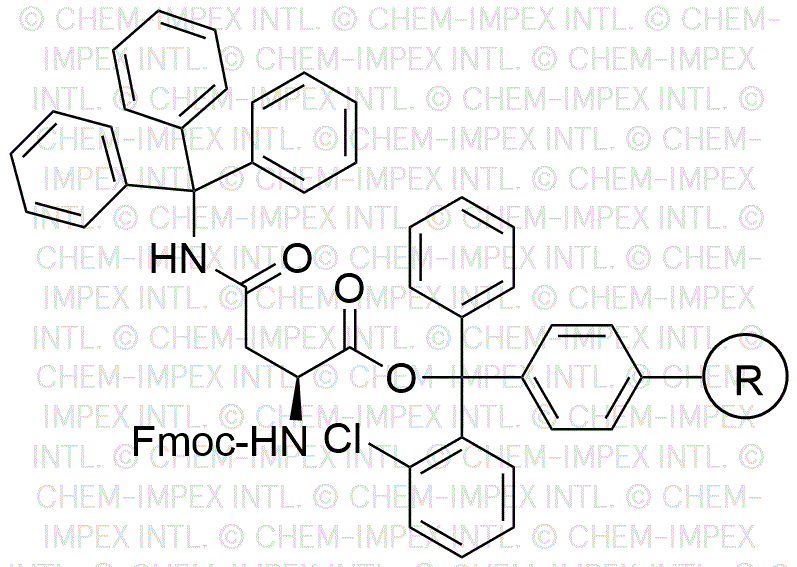Na-Fmoc-Ng-trityl-L-asparagine-2-chlorotrityl resin is widely utilized in research focused on
- Peptide Synthesis: This resin is essential in solid-phase peptide synthesis, allowing researchers to efficiently build peptides with specific sequences, crucial for drug development and therapeutic applications.
- Bioconjugation: It serves as a versatile platform for attaching peptides to other molecules, enhancing the functionality of biopharmaceuticals and improving targeted drug delivery systems.
- Protein Engineering: The resin is used in the modification of proteins, enabling the creation of novel protein variants for research in enzyme activity and protein interactions.
- Research in Cancer Therapeutics: By facilitating the synthesis of peptide-based drugs, it plays a role in developing targeted therapies for cancer treatment, addressing the need for more effective and less toxic options.
- Custom Peptide Libraries: This resin allows for the generation of diverse peptide libraries, which are invaluable in screening for new drug candidates and understanding biological processes.
General Information
Properties
Safety and Regulations
Applications
Na-Fmoc-Ng-trityl-L-asparagine-2-chlorotrityl resin is widely utilized in research focused on
- Peptide Synthesis: This resin is essential in solid-phase peptide synthesis, allowing researchers to efficiently build peptides with specific sequences, crucial for drug development and therapeutic applications.
- Bioconjugation: It serves as a versatile platform for attaching peptides to other molecules, enhancing the functionality of biopharmaceuticals and improving targeted drug delivery systems.
- Protein Engineering: The resin is used in the modification of proteins, enabling the creation of novel protein variants for research in enzyme activity and protein interactions.
- Research in Cancer Therapeutics: By facilitating the synthesis of peptide-based drugs, it plays a role in developing targeted therapies for cancer treatment, addressing the need for more effective and less toxic options.
- Custom Peptide Libraries: This resin allows for the generation of diverse peptide libraries, which are invaluable in screening for new drug candidates and understanding biological processes.
Documents
Safety Data Sheets (SDS)
The SDS provides comprehensive safety information on handling, storage, and disposal of the product.
Product Specification (PS)
The PS provides a comprehensive breakdown of the product’s properties, including chemical composition, physical state, purity, and storage requirements. It also details acceptable quality ranges and the product's intended applications.
Certificates of Analysis (COA)
Search for Certificates of Analysis (COA) by entering the products Lot Number. Lot and Batch Numbers can be found on a product’s label following the words ‘Lot’ or ‘Batch’.
Numéro de catalogue
Numéro de lot/série
Certificates Of Origin (COO)
This COO confirms the country where the product was manufactured, and also details the materials and components used in it and whether it is derived from natural, synthetic, or other specific sources. This certificate may be required for customs, trade, and regulatory compliance.
Numéro de catalogue
Numéro de lot/série
Safety Data Sheets (SDS)
The SDS provides comprehensive safety information on handling, storage, and disposal of the product.
DownloadProduct Specification (PS)
The PS provides a comprehensive breakdown of the product’s properties, including chemical composition, physical state, purity, and storage requirements. It also details acceptable quality ranges and the product's intended applications.
DownloadCertificates of Analysis (COA)
Search for Certificates of Analysis (COA) by entering the products Lot Number. Lot and Batch Numbers can be found on a product’s label following the words ‘Lot’ or ‘Batch’.
Numéro de catalogue
Numéro de lot/série
Certificates Of Origin (COO)
This COO confirms the country where the product was manufactured, and also details the materials and components used in it and whether it is derived from natural, synthetic, or other specific sources. This certificate may be required for customs, trade, and regulatory compliance.


